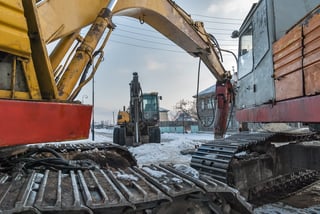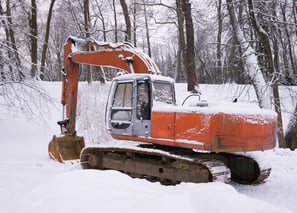 If anyone knows about cold, it’s the Russians. Humans and animals have waged war with vast stretches of frozen tundra for millennial, but what could those warm-blooded mammals possibly have in common with modern heavy equipment? … The answer is starting up on a frigid morning.
If anyone knows about cold, it’s the Russians. Humans and animals have waged war with vast stretches of frozen tundra for millennial, but what could those warm-blooded mammals possibly have in common with modern heavy equipment? … The answer is starting up on a frigid morning.
Acknowledging that the title is bit of a stretch, one has to be impressed with the enormity of this breakthrough and the possible ramifications to heavy equipment operations and aviation worldwide.
The autonomous starter system consists of a hybrid electric energy storage device that is based on a supercapacitor module and a gasoline generator. When activated, “the generator recharges the supercapacitor which simultaneously produces a very powerful launcher charge.”
 The main element of the supercapacitor is a nanocarbon material “obtained” by a research team from the National University of Science and Technology MISiS. The article does not mention how or where the nanocarbon was obtained, ahem, thus furthering the stereotype of Russian mystique.
The main element of the supercapacitor is a nanocarbon material “obtained” by a research team from the National University of Science and Technology MISiS. The article does not mention how or where the nanocarbon was obtained, ahem, thus furthering the stereotype of Russian mystique.
According to the article, “the starter system device works in a standalone mode, as it doesn't require the presence of a main power outlet, and at fully-charged conditions, it is able to start a dump truck 10 times in a row and at temperatures ranging from -40 °C to -60° C, among other things. Additionally, the starter system can be used to launch light aircraft for general-purpose aviation, which requires a large amount of power in a short period of time, something too demanding for regular batteries.”
These supercapacitors have improved the electric potential and energy capacity over the operating characteristics of current analogues, and reduced module weight and size by 30% over existing technologies. It also “provides more efficient storage and energy accumulation through braking for hybrid and electric vehicles.”
Developers plan to open the first industrial production of these supercapacitors during the first quarter of 2017.
As a sidebar, the nanocarbon capacitors can be used in stationary energy, pulse engineering and medical technology for equipment such as cardiac pacemakers, CT scanners, and X-ray machines.
 Equipment operations in the lower 48 aren’t faced with temperatures reaching anything close to -60° C, but the difficulty of starting trucks, tractors, bulldozers and earthmovers is a daily challenge during the deep of winter in northern states despite the current paradigm.
Equipment operations in the lower 48 aren’t faced with temperatures reaching anything close to -60° C, but the difficulty of starting trucks, tractors, bulldozers and earthmovers is a daily challenge during the deep of winter in northern states despite the current paradigm.
Before one can start a piece of heavy equipment, however, they must first acquire a piece of heavy equipment. CrossCheck’s Multiple Check payment solution is the fastest way for dealers to accept down-payments for new or used units.
To cover the down-payment, buyers write 2 – 4 checks that dealers deposit over a 30-day period according to a mutually convenient schedule. The advantages are huge.
The 30-day window enables buyers to (1) acquire machinery without applying for credit; and (2) simultaneously recover their cash flow in time for the next check deposit.
Furthermore, dealers rest easy knowing that CrossCheck guarantees each check. It’s a rare win-win in the business world, but it’s the way CrossCheck conducts a world of business. Learn more by downloading our free guide.



